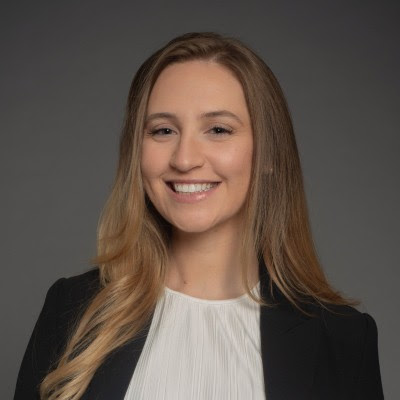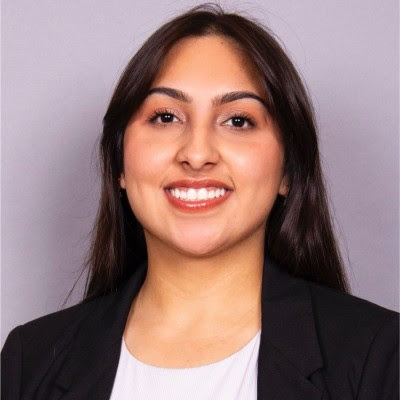Audrey Moore still had a year of law school and no permanent job commitment ahead when she was invited to sign a student-led amicus brief in support of Susman Godfrey in its legal battle against the Executive Office of the President.
The Texas A&M University School of Law student briefly considered how publicly aligning herself against President Donald Trump could hurt future job prospects. But the decision came down to her core motivation for pursuing law in the first place: making a difference.

“I would hope that in 20 years, Googling my name shows this and it’s evidence of me being an early adopter of ‘the right side of history,’” said Moore, who is working this summer at the Dallas County Public Defender’s Office.
In April, the amicus brief — signed by 57 law students from all 10 law schools in Texas — was filed in the case of Susman Godfrey v. Executive Office of the President. The brief argues President Donald Trump’s April 9 executive order against the Houston-based law firm “will cause enduring damage to the legal profession and amici as America’s future lawyers.”
Last month, U.S. District Judge Loren AliKhan of Washington, D.C., declared President Trump’s executive order targeting Susman Godfrey an illegal act of retaliation and a violation of the First Amendment of the U.S. Constitution.
The Texas Lawbook reached out to all 57 Texas students. Most did not respond to the inquiry, while three declined to be interviewed.
Seven spoke with The Lawbook about why they decided to take a bold stance so early in their legal careers and how firms’ responses to the executive order are shaping the values of their generation. To them, the future of the legal field depends not just on winning cases but also defending principles.
RELATED: Susman Godfrey EO Litigation Timeline

Brennan Caruthers, a recent graduate of the University of Texas School of Law, helped galvanize students across the state to lend their signatures to the public document. Caruthers, who was serving as co-president of the National Plaintiffs Law Association, said the amicus brief was born from a growing frustration among students who felt the legal profession had been largely silent in the face of mounting political pressure.
“I was especially watching the first movers because my fear was that too many moving in the direction of cutting deals would signal that this is the way that the entire industry should align,” Caruthers said.
This summer, Caruthers is moving to Chicago and preparing for the bar exam. He plans to pursue a career in plaintiff-side litigation and he’s particularly interested in working on class actions and multidistrict litigation.
Caruthers, who was a summer associate for Susman Godfrey last year, hopes that the brief will serve as a symbol of what the next generation of lawyers stands for.

It matters to law students which firms cut deals with the president, each student who spoke to The Lawbook said. To them, a firm’s values should not change based on who is holding the higher positions of power.
“I wish I didn’t also have to compare whether a firm is supportive of the current president or not,” said South Texas College of Law student Ashley Fortner. Instead, Fortner said she wants to judge a firm based on whether it upholds the rule of law “that you spend three years in law school learning about.”
Katherine Brooks, a student at the University of Houston Law Center, said she made notes of how firms responded and vowed not to apply to work for a firm that conceded to President Trump.
“By committing themselves to pro bono issues that Trump favors (and, since time is a resource, therefore not to issues he disfavors) the law firms that comply are cutting off access to justice for average Americans in favor of giving more time to the pet projects of one person with an immense concentration of wealth and power at his fingertips,” Brooks said. “Justice should not be reserved for the wealthy and powerful.”

Students should consider how a firm responds when deciding where to intern or work because the responses reflect the company culture and values of leadership, said Tia Allen, who graduated this year from Thurgood Marshall School of Law, a historically Black college.
“It’s disheartening to see that some Big Law firms are eliminating their diversity initiatives,” Allen said. “By eliminating such initiatives, the classes who will graduate after mine will be overlooked.”

Allen and other students of color like Clayton Rainey are concerned about the impact of diminishing DEI initiatives on themselves and their peers who will follow.
“When a firm sacrifices DEI initiatives or folds under executive intimidation, it compromises not only its stated values but also the future of those it claims to champion. This includes the next generation of lawyers like me,” said Clayton Rainey, a part-time law student at South Texas College of Law Houston and a full-time litigation paralegal at Paranjpe Mahadass Ruemke (PMR Law), a plaintiff-side personal injury firm in Houston. Rainey plans to remain at PMR Law after graduation next year and passing the bar exam.
Areesha Hemani, a recent graduate of Texas Tech University School of Law and a DACA recipient, was initially hesitant to sign the brief. Originally from Pakistan, Hemani immigrated to the U.S. with her family in 2001 and became a DACA recipient in high school, the same time President Trump was elected to his first term.

“I hesitated,” she said. “If he was willing to revoke visas, I had no doubt that DACA would absolutely be next on the chopping block and signing the brief felt like putting a target on myself. But that fear is exactly what Trump wants, and giving into my fear would mean to obey in advance and give into the rise of authoritarianism.”
Now clerking at Jackson Spencer Law in Dallas, where she’ll work full time after passing the Bar Exam, Hemani plans to focus on plaintiff-side employment law, an area which was inspired by watching her own parents navigate workplace challenges as immigrants.
“Authoritarianism flourishes when we don’t push back,” she said. “It is also incredibly telling that firms only uphold diversity initiatives when there is no pushback. Many of these firms don’t prioritize true diversity in their firms, rather the good [public relations] that comes with implementing diversity programs.”
